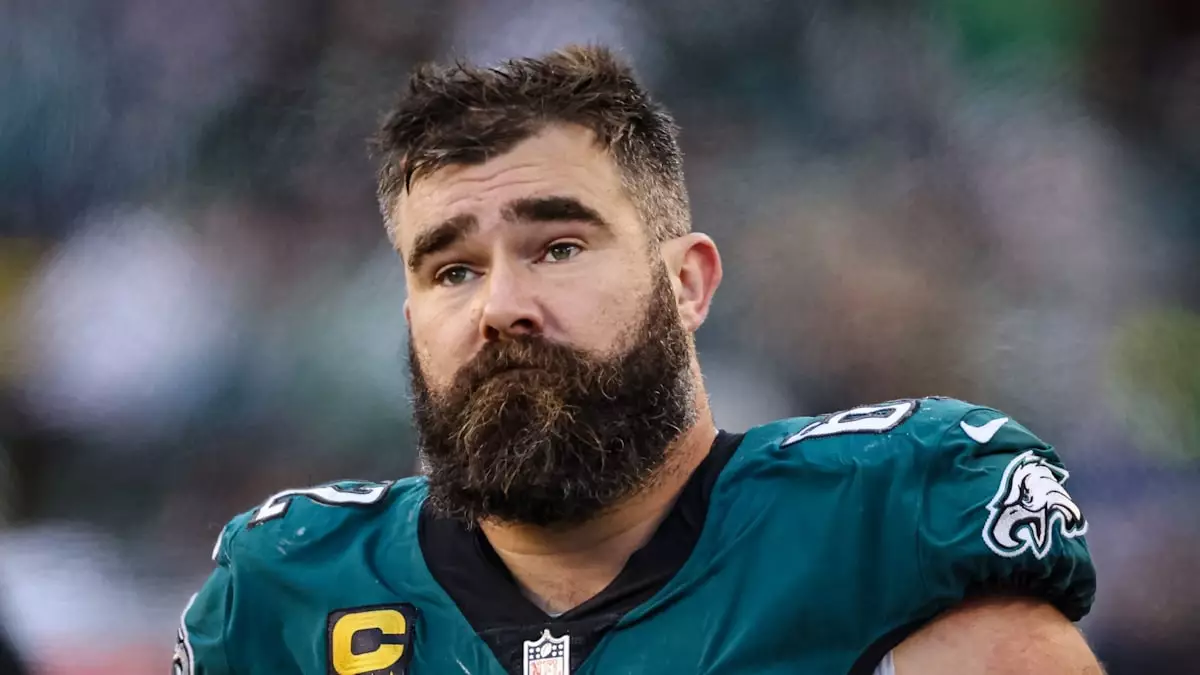After an illustrious 13-year career with the Philadelphia Eagles, Jason Kelce’s transition into retirement has been anything but ordinary. With the adrenaline and physicality of the NFL now in his rearview mirror, Kelce has embarked on an unconventional journey that highlights the challenges many athletes face when stepping away from the sport. Most notably, he’s not just shedding the jersey; he’s shedding pounds, and doing so through what he defiantly labels a “stupid competition.”
The notion of engaging in a body fat percentage contest with fellow NFL player Beau Allen seems almost whimsical when juxtaposed against the high-octane world of pro football. Yet for Kelce, this seems like a necessary step to maintain his mental health and get a grip on his physical condition post-retirement. The competitive spirit that led him to become an NFL stalwart doesn’t simply dissipate with retirement; instead, it morphs into new arenas of challenge.
Body Scanning and Self-Reflection
Kelce’s journey has involved an intimate peek into his own physical state, as evidenced by his experiences with a bone density scan. Such tests, while medically significant, can be psychologically daunting for former athletes accustomed to peak performance and robust physicality. The raw data shared by Kelce indicates that he currently possesses 21% body fat. There’s something both humorous and relatable about how he acknowledges the experience as “embarrassing,” yet realizes its importance in achieving a healthier body composition.
Despite the stigma surrounding body fat, Kelce reported a positive recalibration—his knees and back, which likely endured the toll of rigorous NFL seasons, feel significantly better after losing 20 pounds. This brings to light an often-overlooked aspect of athletic life: the physical rehabilitations that come after years of collision-driven sports. Beyond vanity metrics, these health improvements offer practical benefits, enhancing his ability to engage with his three daughters and, soon, a fourth child.
The Balancing Act of Family and Fitness
One particularly noteworthy dynamic in Kelce’s life is the interaction with his wife, Kylie. While he embarks on his transformation journey, it’s striking to hear his partner’s perspective: she has openly expressed her concerns regarding his weight loss. This adds another layer of complexity to Kelce’s transformation; it’s not merely about his own personal goals, but also navigating the reactions and expectations of family. Kylie’s insistence that she’d be “furious” if he ended up sporting a six-pack speaks volumes about the societal pressures often placed on athletes regarding their bodies after retirement.
In many ways, this candidness encapsulates the core challenge of retirement for many athletes: balancing personal aspirations with familial responsibilities and societal expectations. Their three daughters — Wyatt, Elliotte, and Bennett — provide additional motivation for Kelce. As his family grows, including the anticipated arrival of another daughter, the need to remain active and healthy is pivotal not just for his well-being, but for his role as a father.
The Artistic Challenge of Parenting
With each family milestone, there’s a rich narrative woven into the fabric of Kelce’s adjustments. The fascinating discussion around naming their fourth child hints at a broader conversation about identity and representation in family structures. Kelce and Kylie have noted their intention for a gender-neutral name, reflecting a modern parenting ethos that values inclusivity and harmony within sibling dynamics.
This narrative is a fascinating intertwining of athletics, family life, and societal norms. As they navigate these waters, they embrace contemporary cultural conversations about identity, showcasing their ability to adapt and remain attuned to the sentiments of their children.
In the broader context, Jason Kelce’s journey isn’t merely about weight loss; it’s a rich tapestry of growth, humor, and vulnerability. As he takes on new challenges, from body fat competitions to family planning, he remains a compelling figure transitioning between the worlds of sport, personal health, and parenting. Through his experiences, he illustrates that life after sports can indeed be a competitive, engaging, and deeply fulfilling endeavor.

